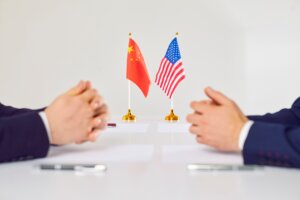
If there is one thing that is certain by now is the fact that the US and China trade war is here to stay – for a long time. (Photo by Jim WATSON / AFP)
US-China: The trade war heightens with a new executive order
- The executive order, to be implemented in 2024, will undoubtedly intensify the US-China trade war.
- The order declares a national emergency, directing the Treasury Department to establish a program to oversee a new instrument to review outbound investments in national critical sectors.
One thing that’s certain by now is the fact that the US and China trade war is here to stay – for a long time. Since it began in July 2018 under then-president Trump, the battle has developed and further complicated the relationship between the two economic powerhouses.
Even since President Joe Biden took office in 2021, a few iterations of executive orders have been announced, and his administration is still on it. This week, the US announced a new investment screening mechanism, and ironically, it isn’t targeting China alone. It includes China’s special administrative regions, such as Hong Kong and Macau.
All the countries were noted as the only point of concern in what Biden dubbed the ‘emergency declaration.’ Biden declared the latest move “a national emergency to deal with the threat of advancement by countries of concern in sensitive technologies and products critical to the military, intelligence, surveillance, or cyber-enabled capabilities of such countries”.
All about the latest executive order in the US-China trade war

US President Joe Biden speaks on “Bidenomics” at Arcosa Wind Towers in Belen, New Mexico, on August 9, 2023. (Photo by Jim WATSON / AFP)
On August 9, this week, Biden signed an executive order to narrowly prohibit certain US investments in sensitive technology in China and require government notification of funding in other tech sectors. Ironically, the announcement came on the first anniversary of Biden signing the Chips and Science Act into law.
But the order didn’t come off as a surprise – it was long-anticipated. This time, it is intended to curb US venture capital and private equity investments in Chinese companies covering semiconductors and microelectronics, quantum information technologies, and specific artificial intelligence (AI) systems.
In a letter to Congress, Biden declared a national emergency to deal with the threat of advancement by countries like China “in sensitive technologies and products critical to the military, intelligence, surveillance, or cyber-enabled capabilities.” Therefore, the order also called for creating an outbound investment review mechanism.
The move is primarily because the export controls unveiled last October by the US “don’t include investments abroad that can help foreign adversaries or countries of concern to fuel indigenous development of national security technologies,” an administration official said, according to South China Morning Post.
“By adding outbound investment screening to our suite of national security tools, we’re enhancing US capabilities to safeguard our national security,” the official added. However, unlike most past orders or bans, the latest move also seeks to blunt China’s ability to use US investments in its technology companies to upgrade its military while preserving broader levels of trade that are vital for both nations’ economies.
The US is cautious this time
This time, administration officials, including Commerce Secretary Gina Raimondo and Treasury Secretary Janet Yellen, have said the US seeks to keep the scope of the new investment restrictions as narrow as possible to limit the damage to the bilateral relationship. The US wants to avoid worsening the trade war with China.
“You don’t want the cutline to be so broad that you deny American companies revenue and China can get the products elsewhere, or China gets products from other countries, so what we’re trying to do is be narrowly defined [and] work with our allies on these choke point technologies,” Raimondo said last month.

The executive order–to be implemented in 2024–will undoubtedly intensify the US-China trade war, experts reckon. Source: Shutterstock
Unfortunately, China did not see it as optimistically as the US. Following the announcement, a spokesperson for the Chinese embassy in Washington said that China is “very disappointed” by the move. In a statement, Liu Pengyu said the curbs would “seriously undermine the interests of Chinese and American companies and investors” and added: “China will closely follow the situation and firmly safeguard our rights and interests.”
Meanwhile, China’s commerce ministry in Beijing accused the US of disrupting global industry and supply chains. The executive order “seriously deviates from the market economy and fair competition principles the US has always promoted, and affects companies’ normal operation decisions,” a spokesperson said.
The order is expected to be implemented next year, a person briefed on the order said, after multiple rounds of public comment, including an initial 45-day comment period. Emily Benson of the Center for Strategic and International Studies (CSIS), a bipartisan policy research organization, said the move by the US signals a seismic broadening of the US trade, investment, and technology tool kit that reflects a gap in existing government authorities.
“This begs an obvious question about why the US lacks authority to review outbound investments in countries of concern for certain end uses that pose national security threats,” she noted. In other words, Benson believes there is a conspicuous missing piece in the ability of the US government to ensure that US capital—both funding and know-how—is not used to advance foreign military capabilities.
“The August 9 executive order thus stands up the scaffolding for a system to close this gap,” she summarized. The takeaway, for now, is that the latest order creates an opportunity for the administration to articulate even more clearly to skeptics that these investments pose a national security risk, thus meriting a new review regime.
This considers the hard lessons the US government has learned after the October 7 export controls, including that allies and companies need to be more adequately briefed on the underlying national security justifications for the controls.
READ MORE
- The threat of fraud networks in the APAC: KYC and beyond
- Next-gen CX is based on customer communication management systems.
- Enhancing Business Agility with SASE: Insights for CIOs in APAC
- 3 Steps to Successfully Automate Copilot for Microsoft 365 Implementation
- Trustworthy AI – the Promise of Enterprise-Friendly Generative Machine Learning with Dell and NVIDIA
